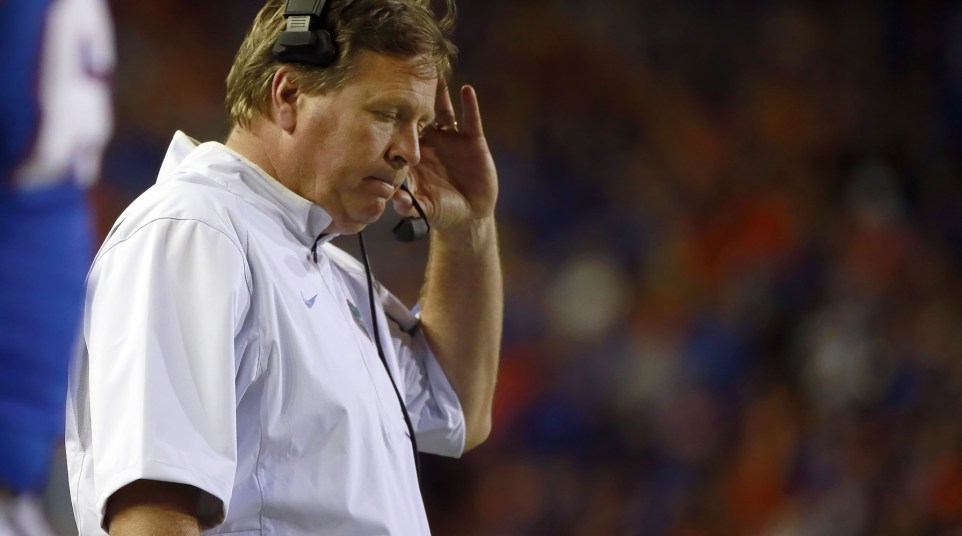
Do over: What moment would the Gators take back from the past 5 years?
The past five seasons (2011-15) will fade into distant memory over time for most Gators fans. None of the years will make The Swamp walls for any Heisman winners or SEC Championships or national titles. The period encompasses the disappointing Will Muschamp tenure and the beginning of the Jim McElwain era.
It’s been a tough five years on the Gators, particularly on quarterbacks. If the Gators could undo one moment from that stretch, what would it be? Here are some ideas:
John Brantley’s high ankle sprain against Alabama (2011)
Why? The 2011 season was largely forgettable, but Brantley’s pro-style skill set was an ideal fit in the Charlie Weis system. The Gators entered the game 4-0, and were actually hanging with eventual national champions until the quarterback went down with a high ankle sprain.
Without Brantley, Weis was forced to play two true freshmen, Jeff Driskel and Jacoby Brissett against the Crimson Tide and in the next two games (at No. 1 LSU and at No. 24 Auburn). Brantley returned against No. 22 Georgia, Florida’s fourth loss in an 0-for-October.
One could argue that the biggest impact this had was preventing either of the freshmen quarterbacks from redshirting and creating separation on the depth chart. At the conclusion of the 2012 season, Brissett decided to transfer instead of entering his junior season as the likely backup at Florida. The Gators certainly could have used him in 2013 when Driskel went down with his own leg injury – more on that later.
Why bother? Even though it would have been preferable to redshirt Brissett or Driskel in 2011, it might not have stopped Brissett from transferring to N.C. State. It was Weis who recruited Brissett, but he left following the 2011 season to take the head coaching job at Kansas. With Brent Pease as offensive coordinator in 2012 and 2013, the starting quarterback job was likely Driskel’s regardless of Brissett’s eligibility status. Since Florida finished 3-5 in the SEC East, it’s hard to argue that the Brantley injury had much of an impact on the division race, which was won by Georgia (7-1).
Jordan Reed’s fourth-quarter fumble against Georgia (2012)
Why? The 2012 team finished the regular season 11-1, but missed out on playing in the SEC Championship Game because that one loss was to Georgia, which won the division. Reed looked to be on his way to scoring a touchdown had he not fumbled on the 5-yard line with 2:05 left. A touchdown have cut the Bulldogs’ lead to 17-15 before a possible 2-point attempt.
Why bother? For one, Florida still would have needed to convert a 2-point try just to tie the score – it was far from decided on Reed’s play either way. Second, considering how the Gators were beaten handedly by Louisville in the Sugar Bowl, it’s a little bit difficult to consider the 2012 squad deserving of a spot in the BCS Championship Game. The SEC championship game would have featured a matchup against eventual national champion Alabama.
Jeff Driskel breaks his leg against Tennessee (2013)
Why? Brissett’s transfer left the Gators dangerously thin at quarterback in 2013 and that danger was realized when Driskel went down. While backup Tyler Murphy was good enough to have the Gators hold on against UT and defeat Kentucky the following week, things quickly went downhill. An injury to Murphy forced the Gators to play third-stringer Skyler Mornhinweg in a demoralizing close to a 4-8 season.
Florida football is still recovering in many ways from the 4-8 season, and it’s hard to imagine the Gators losing seven of their final eight games with Driskel as quarterback. Driskel was notably underperforming in 2013, but his career shows he was still a more capable quarterback than Murphy or Mornhinweg.
Why bother? Driskel not getting hurt against Tennessee does not fix the quarterback depth chart for 2013. Although Muschamp was not fired immediately after the 4-8 season, it certainly played a large part in why he was let go in 2014. If the Gators had gone 6-6 or 7-5 with Driskel at quarterback for the whole 2013 season, that likely delays Muschamp’s eventual dismissal.
Without the 4-8 season, it’s impossible to know when athletic director Jeremy Foley would have pulled the trigger on firing Muschamp. To many Gators fans, the idea of Muschamp still in Gainesville qualifies as a dystopian nightmare.
These were all tough blows in the past five years, but there was one moment that hurt Florida football even more.
Will Grier takes a banned substance (2015)
The redshirt freshman had the Gators at 6-0 and leading the SEC East when his suspension was announced the week of the LSU game. They had defeated Tennessee and crushed No. 3 Ole Miss. He led the conference in completion percentage (65.6) at that time, and was the quarterback for the five best quarters of Florida’s season against Tennessee and Ole Miss.

Credit: Denny Medley-USA TODAY Sports
In his absence, the UF offense failed to function, and what could have been a special season ended on a dreadful three-game losing skid. The situation ultimately led to his transfer, affecting the quarterback position in 2016 and possibly 2017.
Grier’s situation has more unknowns than any others, but that’s part of what it makes it so enticing to undo. For my money, the 2015 squad had the best chance of any team in the past five years to make a run at a national championship. The 2012 team posted a better record, but I would take the 2015 team with Grier over the 2012 team with Driskel every time.
There’s no way of knowing how the Grier-led Gators would have fared against FSU or Alabama, but the team would have certainly scored more than 17 points.
Would he have been the same completely clean? We’ll never know, but Gator Nation would have loved to find out.
